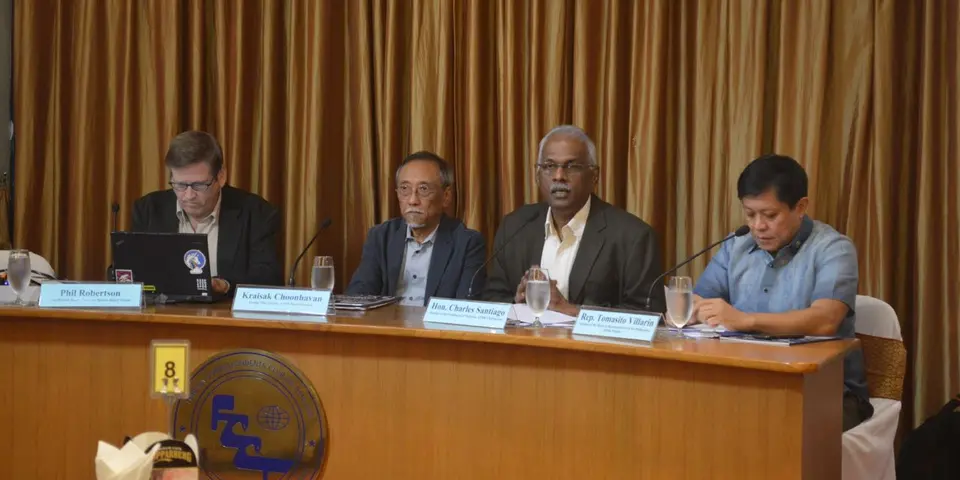
Attacks on lawmakers threaten the legitimacy of Cambodia’s political system, ASEAN MPs warn in new report
March 20, 2017

BANGKOK, 20 March 2017 – The Cambodian political system is facing a crisis of legitimacy that threatens to undermine the country’s already fragile claims on democracy, parliamentarians from across Southeast Asia warned today, citing a surge in harassment, threats, and attacks against lawmakers and civil society.
In their latest report, Death Knell for Democracy: Attacks on Lawmakers and the Threat to Cambodia’s Institutions, ASEAN Parliamentarians for Human Rights (APHR) argue that the government’s efforts to undermine the political opposition in Cambodia through judicial harassment and other attacks against legislators are having a far-reaching impact and are undermining core institutions in the country.
“In the [ruling party’s] haste to ensure that the opposition remains unable to effectively challenge its rule in upcoming electoral contests, it has dispensed with adherence to proper procedures and relied heavily on a politicized judicial system, a pliant legislature, and violent mobs to carry out its goals – actions which threaten the system itself and make reform an ever more distant possibility,” APHR argues in the report.
“Death Knell for Democracy” documents the wave of persecution faced by Cambodian parliamentarians since the collapse of a détente between the ruling party and the opposition in mid-2015. The phenomenon has been characterized by politically motivated court cases, the abuse of parliamentary procedures, the passage of new restrictive legislation, and ongoing threats of violence and intimidation. Since mid-2014, at least 15 opposition lawmakers have faced judicial prosecution. Others have faced intimidation and physical attacks, including two MPs who were brutally beaten outside the National Assembly by pro-government protesters in October 2015.
As the report argues, “Addressing persecution and threats against lawmakers, including through revision and clarification of relevant statutes and efforts to ensure all actors adhere to the law, must therefore be a priority for all parties interested in stability, prosperity, and accountability in Cambodia.”
Presenting the report at a press conference in Bangkok, APHR members from several ASEAN nations argued that Cambodia risks the complete erosion of democratic institutions and possible political violence if regional and international actors fail to speak out and apply sufficient pressure on the government to cease its abuses.
“What’s happening in Cambodia is a warning for the whole region. It’s a case study in how a ruling party’s efforts to keep itself in power can undermine and destabilize an entire system,” said Charles Santiago, APHR Chairperson and a member of the Malaysian Parliament.
“We’re looking at the very real possibility of Cambodia becoming a one-party state and the serious threat of violence, especially as critical elections approach. If the international community, including ASEAN, fails to take a stronger position, they risk enabling Cambodia’s descent into a full-blown, brutal autocracy.”
APHR said that new amendments to the Law on Political Parties, combined with a sustained assault on lawmakers, civil society, and anyone perceived as too critical of the government, constitute a systematic effort to prevent Cambodians from speaking out and from challenging the ruling party. MPs said that these actions significantly undermine the prospect of free and fair elections at the commune and national levels in 2017 and 2018, respectively. They urged international actors to commit to observing commune-level elections coming up in June of this year.
“International election monitoring will be critical and needs to start now,” Santiago said. “The pervasive and deeply damaging climate of fear risks preventing an enabling environment for a truly free and fair vote.”
“Cambodia has a possibility of succeeding, but it is being jeopardized by the current trends and hostile climate in the country,” said Kraisak Choonhavan, an APHR Board Member and former Senator from Thailand. “Genuine dialogue will be critical to salvaging any hope for Cambodia’s fragile democratic institutions.”
On Sunday, APHR members concluded a two-day fact-finding mission to Phnom Penh, during which they met with a variety of stakeholders to discuss the human rights situation, including escalating persecution of opposition lawmakers, activists, and independent civil society. They presented the findings from that visit in Bangkok, releasing an end of mission statement highlighting key issues and concerns.
“Civil society is scared—and with good reason. Their fundamental freedoms and ability to conduct their legitimate, important work are under threat,” said Tom Villarin, a member of the Philippine House of Representatives, who joined the mission to Cambodia.
“Attacks on MPs send a clear and disturbing message not only to the political opposition, but to all members of society: If they can do this to sitting parliamentarians, think of what they could do to everyday Cambodians. And as we’ve seen, civil society is facing increasing attacks as well,” Villarin said.
APHR called for the immediate release of all human rights defenders currently imprisoned, including Boeung Kak Lake’s Tep Vanny and the five current and former ADHOC staffers, who have been in pre-trial detention for nearly a year. MPs also called on the Cambodian government to cease its harassment of civil society and opposition voices.
“Cambodia has reached an inflection point. It’s clear that the ruling party wants to remain in power, but its actions are having deeper, more destabilizing ramifications than ever before,” Villarin said. “Without drastic changes, we’re likely to see continued backsliding and an increasingly hostile and dangerous environment for all parties.”
ASEAN Parliamentarians for Human Rights (APHR) was founded in June 2013 with the objective of promoting democracy and human rights across Southeast Asia. Our founding members include many of the region's most progressive Members of Parliament (MPs), with a proven track record of human rights advocacy work.